Well-known names from the world of gospel music and the Black church gathered at the Museum of the Bible in Washington, D.C. to hail the contributions of African American churches and to call for continued efforts toward building unity and bridging divides.
The “Blessing of the Elders,” an awards celebration held Thursday just blocks from the U.S. Capitol, specifically honored seven leaders known for their contributions in megachurches, denominational leadership, civil rights, music and religious broadcasting.
The Rev. A.R. Bernard, an honoree and a Brooklyn, New York, pastor, described the Black church, in its varied expressions, as a repository of Black culture in America.
“Embracing Christianity, Blacks didn’t seek to imitate white Christianity — oh no, instead we created a parallel religious culture, our own brand of Christianity with our own hymns, music, style of worship, much influenced by the challenge of slavery,” Bernard said in the museum’s World Stage Theater.
“Christianity gave Blacks hope in the midst of a hopeless situation, and we’re not done yet. I believe the 21st century will see the Black church lead the way to hope and healing in a deeply divided nation.”
Your tax-deductible gift helps our journalists report the truth and hold Christian leaders and organizations accountable. Give a gift of $30 or more to The Roys Report this month, and you will receive a copy of “Hurt and Healed by the Church” by Ryan George. To donate, click here.
One honoree, Bishop Charles E. Blake Sr., the former top leader of the Church of God in Christ, was unable to attend due to medical reasons.
“Bishop Blake wanted me to tell you he was sorry he couldn’t be here,” said Harry Hargrave, chief executive officer of the Museum of the Bible. “He’s coming off of COVID. He’s feeling much better.”
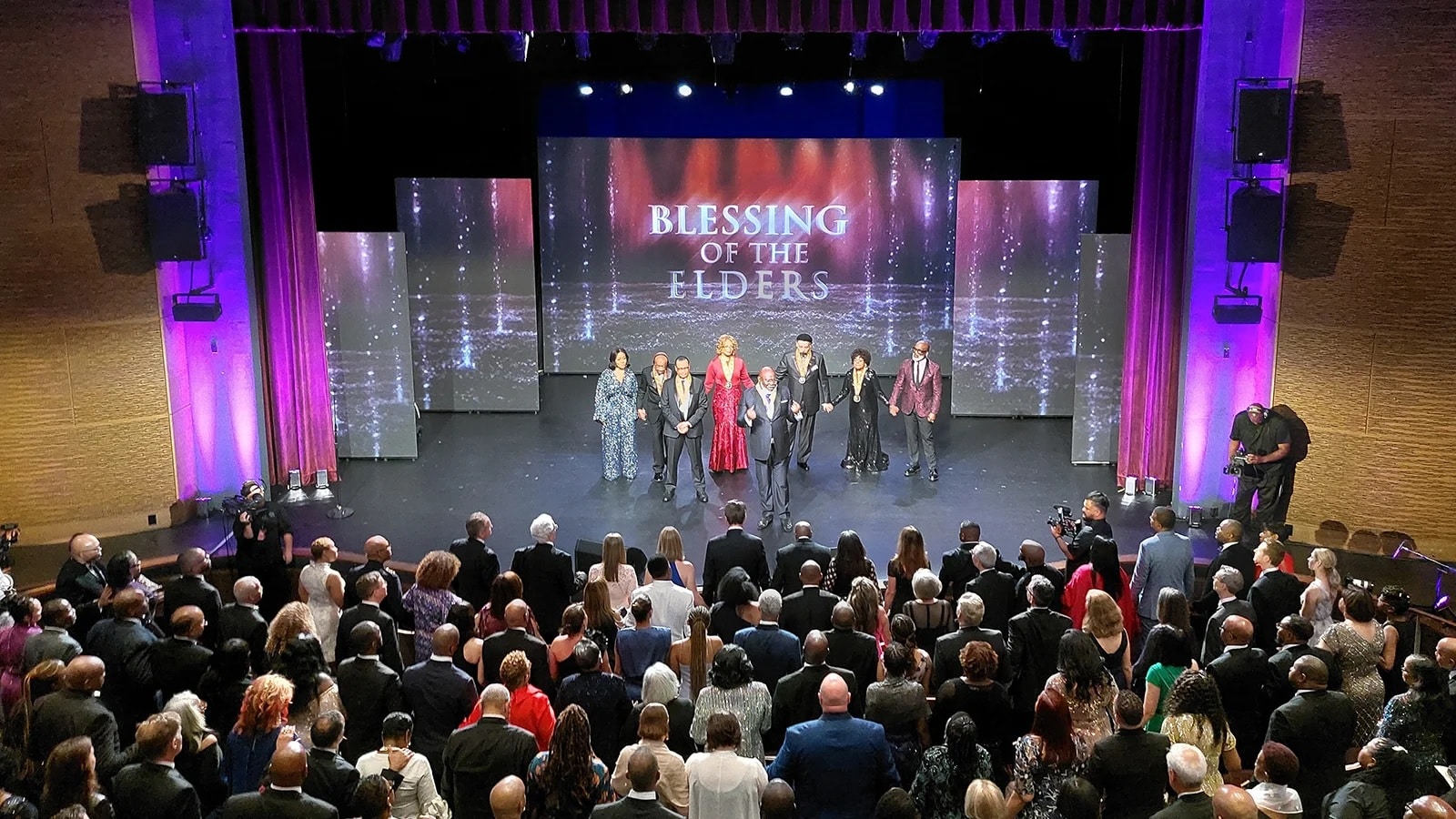
Jon Sharpe, the museum’s chief relations officer, and the Rev. Tony Lowden, pastor of the Georgia church where former President Jimmy Carter is a member, took the stage to explain how the predominantly Black gathering came to be.
Sharpe said he had a vision two decades ago that “the Black church is going to lead spiritual renewal in America.”
The museum executive, who is white, shared his idea over dinner with Lowden, an African American man who had attended a 2020 fatherhood conference at the museum. Lowden said the concept — which Bernard now calls a “movement” — resonated with him.
“There was a move that we had to answer, asking us to come together, go around the nation to talk about how we can bring the Black church together to lead,” Lowden said.
Over the course of the more than three-hour ceremony, coming together and overcoming were recurrent themes.
“The only way we can go forward now is with ‘love one another,’” said honoree John Perkins, a civil rights veteran and reconciliation advocate, quoting the New Testament book of 1 John and elevating the church as a whole over congregations attended by Black or white people. “‘He that loves knoweth God. He that loveth not knoweth not God.’”
North Carolina pastor Shirley Caesar, an honoree known for her award-winning gospel singing, spoke of worshipping in the “red church,” based on the sacrifice of Jesus, rather than at a Black church or a white church.
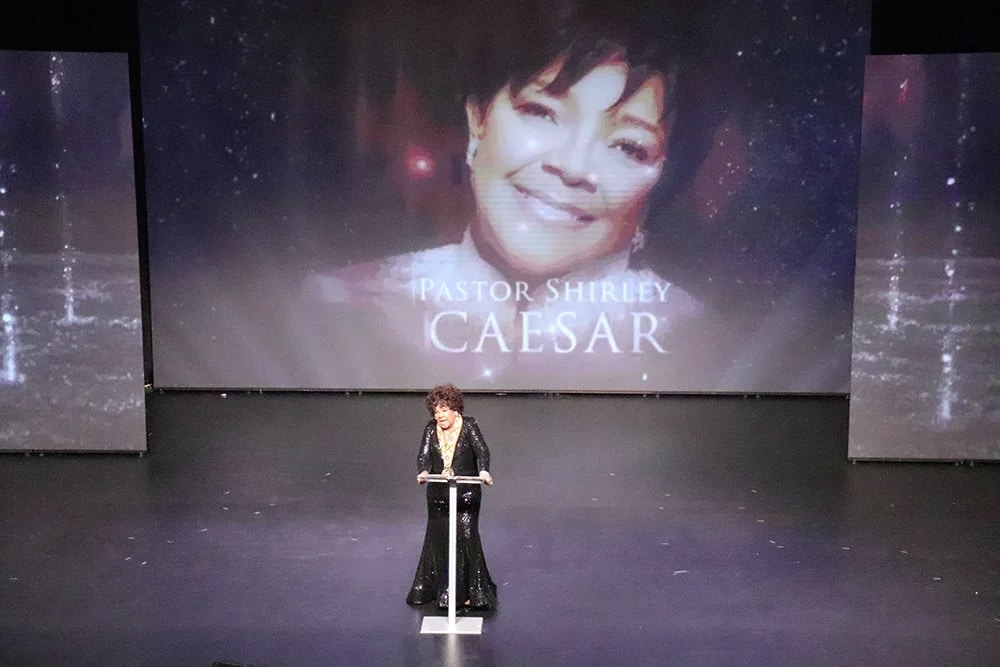
And Dallas pastor Tony Evans also spoke of a unified church, saying, “It’s time to go public as the Black church and white church of the kingdom of God, the glory of God and the advancement of his rule in history. It’s time for the church to lead the way.”
Bishop Vashti McKenzie, an honoree and the first woman prelate in the more than 200-year-old African Methodist Episcopal Church, said she accepted her award “on behalf of women who have been pushed to the margins of church culture, yet their gifts continue to make room for them.” As McKenzie stood between her daughter and granddaughter, whom she asked to join her on stage, she urged others to adhere to the biblical admonition to “stand firm.”
Actor and producer Denzel Washington, one of the presenters at the event, noted his spiritual trajectory was shaped by two of the evening’s honorees as they led churches on opposite U.S. coasts — Blake’s West Angeles Church of God in Christ in Los Angeles and Bernard’s Christian Cultural Center in Brooklyn.
“It’s been an amazing 40-year journey from Bishop Blake’s church, where I first was filled with the Holy Spirit, to tonight,” Washington said, noting that Bernard, “a man of God with a mind of God,” had asked the actor to speak during his time of tribute. “It has been a blessing for all of us to be students of Pastor A.R. Bernard. It’s been a blessing for me personally to have someone that I can talk to, ask questions.”
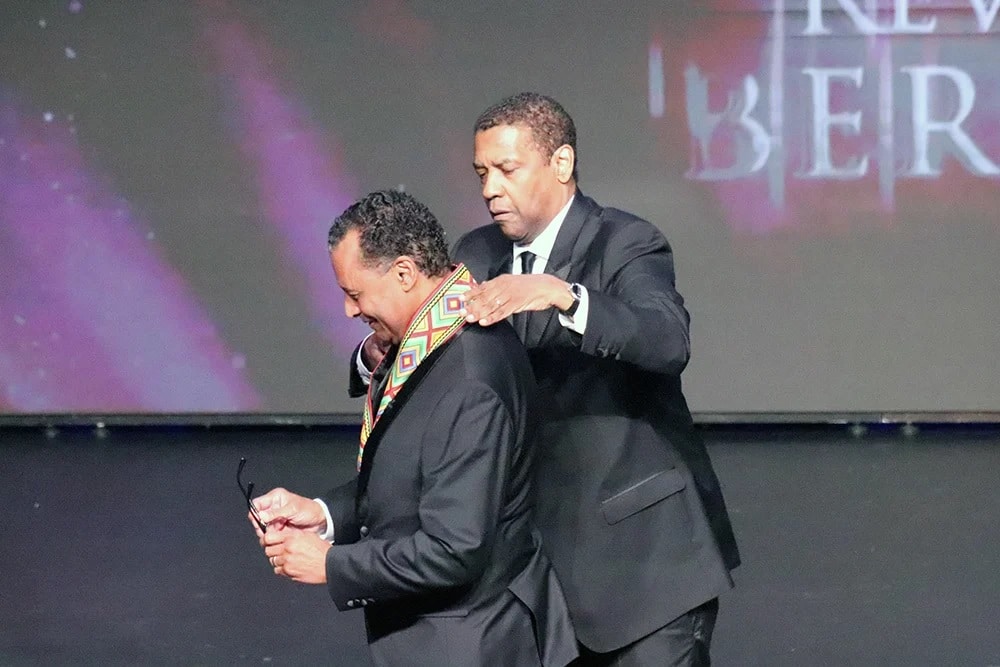
Between prayers and speeches, a range of Black church music was featured, including from co-hosts BeBe Winans and Erica Campbell — who also harmonized a bit of “Amazing Grace” while awaiting a working teleprompter. Wintley Phipps, Pastor Marvin Winans, Lecrae, the Clark Sisters, Tramaine Hawkins, Fred Hammond and Anthony Brown & group therAPy also performed.
The Blessing of the Elders initiative, which thus far has included a steering committee and been supported by the Museum of the Bible and partnering foundations, individuals and corporate sponsors, is now a not-for-profit corporation that Bernard will chair. In an interview before the gala, he said its next steps could include a documentary, an exhibit or a curriculum about the history of the Black church that would be particularly intended for white churches “to walk a mile in our shoes.”
Steve Green, board chair and founder of the museum, said in a separate interview that a temporary exhibit centered on the Black church — delving more into the subject than what is already featured in its Bible in America permanent exhibit — is a possibility at his facility.
“To be able to do a deep dive within the Black community and the Black church is an exciting opportunity for us to consider because there is a story to be told,” he said.
The evening ended with a blessing of the celebrated elders, but Bishop T.D. Jakes, another honoree, made it clear the concluding prayer should not be solely for the seven people with bios in the program but rather all those who gathered to laud them.
“Perhaps the greatest elders are not on this stage; perhaps the greatest elders are you,” he said. “So if we bless the elders and exclude you from the blessing, we will have missed the opportunity of God’s attention. Because the future is in your hands and your mouth. We’ve all spoken. The next message is on you.”
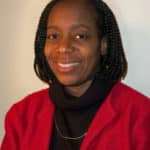 Adelle Banks is production editor and a national correspondent at Religion News Service.
Adelle Banks is production editor and a national correspondent at Religion News Service.




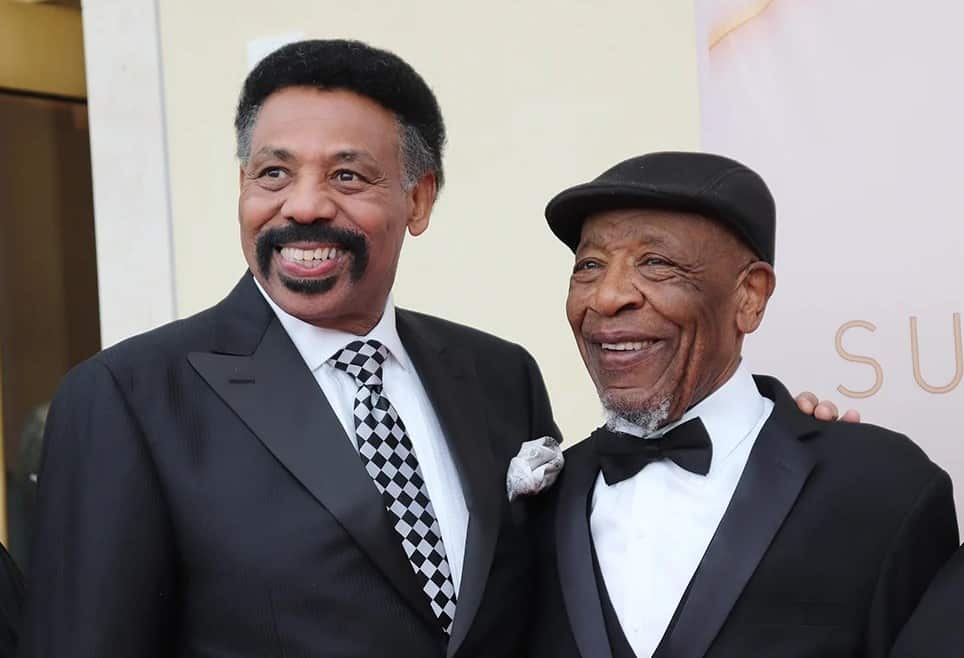
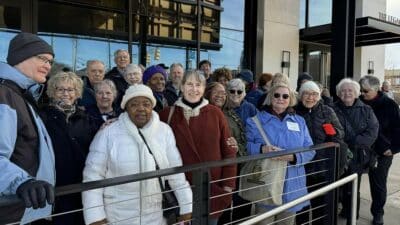
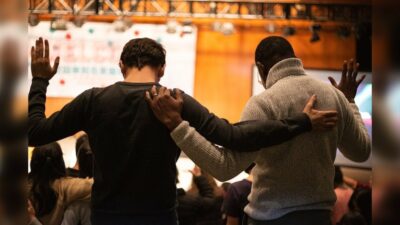
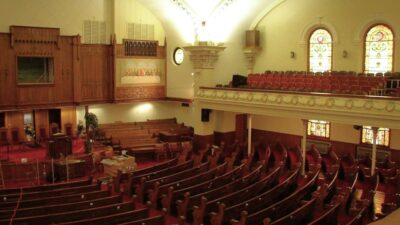

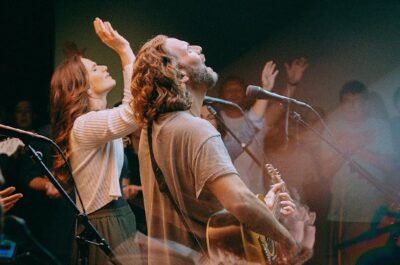

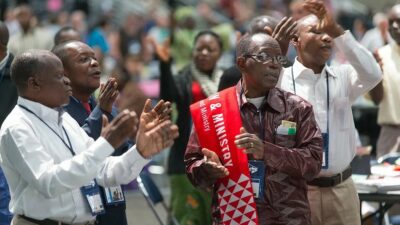
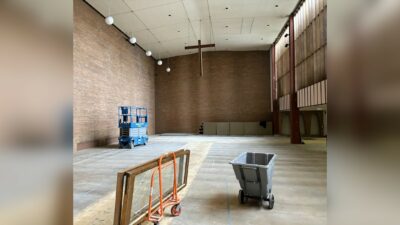
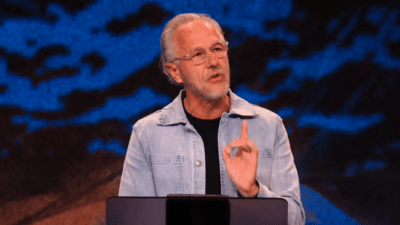






18 Responses
There is only one race—and that is the human race. So of course, we absolutely love our black brothers and sisters in Christ! And where would we be without the exuberance and joy of gospel worship music? In a dry and thirsty land!
However, I do not believe it is helpful for Christians to honor “black luminaries” any more than it is appropriate to distinguish “white luminaries” or “brown luminaries” or “yellow luminaries.” Such distinction feeds into the divisions and diversions of the world. There is only one blood; one church; one baptism; and one body in Christ Jesus.
Furthermore, such honoring ignores a vastly more important and dare I say “critical” concern than the color of one’s skin—and that is, the importance of correcting heresies and advancing sound doctrine.
For all of the praiseworthy contributions to the faith made by Tony Evans, for example, he holds to several unbiblical doctrines: “Evans’ heresies include (but are not limited to) Pelagianism (the denial of original sin), Inclusivism (you don’t have to be a Christian to be saved), and Limited Theism (the denial of God’s omnipotence).”
Another honoree, T.D. Jakes, teaches the heresy of modalism, or “oneness Pentecostalism” which “denies that there are three distinct and co-eternal persons in the godhead.”
I’m sure we could rout out other unbiblical doctrines among those in attendance. And so, such departures from the faith “once delivered to the saints” should not be honored; rather, they should be reproved and rebuked, as Paul exhorted, “with all longsuffering and doctrine” (2 Timothy 4:2).
Finally, we don’t need a “parallel religious culture” or another “brand” of Christianity. What we need is a unity of the faith that is rooted in creeds, not color.
Well said Mark well said
Mark, curious to hear what’s worked for you in making this declaration a reality.
“[W]e don’t need a ‘parallel religious culture’ or another ‘brand’ of Christianity. What we need is a unity of the faith that is rooted in creeds, not [colour]”.
Eleven o’clock Sunday mornings remains highly racially segregated in America. If Christians truly believe in “unity of [our] faith . . . rooted in creeds, not colour”, then why don’t our assemblies reflect it? And how can we make it a reality?
Wow Bernard that’s amazing you said that. So now we need busing for Sunday’s. It’s called neighborhood. All throughout America diversity isn’t the norm in most neighborhoods.
Gary –
I truly believe this is an excuse. There are people who “commute” to church – bypassing many churches that are in their neighborhood to go where the Lord calls them – not what’s closest. (I am one who commutes about 30 minutes from one neighborhood to another).
Let’s just own it: as a whole, we are more comfortable in congregations of people who look like us, and are not willing to do the work and/or get outside of our comfort zone to go fellowship with others who don’t look like us (especially if that will involve being in the minority). Just as it’s easy to talk about loving those who are like us, it’s easy to talk about unity when it involves aligning with people who look and think like us. Even unbelievers do that.
But Christ calls us as His disciples to go further than that. Our churches should reflect that.
“All throughout America diversity isn’t the norm in most neighborhoods.”
Gary–dig deeper as to why this is.
Where on earth are you getting your information about Tony Evans?
It is disingenuous to criticize “black” churches while failing to mention the history behind why they exist.
African Americans have a unique history in this nation as they have been oppressed by the larger secular society and by whites in the church. The dehumanization, racism and outright cruelty by white Christians was a driving factor in the establishment of so many “black” denominations. The AME church was established after black Christians were physically dragged by whites from churches as they prayed. Black churches have been bombed and destroyed. Men, women and children have been brutally murdered by whites even as they worshipped. White Christians have created seminaries and schools in the name of God excluding blacks and advocating for segregation. They have deceitfully misrepresented scripture to provide theological cover to justify all kinds of evil from slavery to Jim Crow/Black Codes and other societal evils. The remnants of this hatred extend to this day.
Your comment is unfortunate but predictable. The existence of black churches and the souls that occupy the pews will always trigger patronizing comments like these. Why? Because African American churches are an affront to white American congregations and a constant reminder of the degeneracy, evil and immorality of white Christians, so many of whom have brought utter shame to the name of Christ, defiling his Gospel and utterly failing to keep his two most important commandments.
Mark:
If White Christians had lived up to what they professed to believed, then we wouldn’t have so much segregation in the Body of Christ between Blacks and Whites. Until many White Believers repent of their sins of racism, prejudice, and a sense of superiority, there will never be reconciliation between the various ethnic groups. As much as I try to live through color blind lens, it is constantly thrown in my face due to well known people that should know better, but who are at the fore-front of the racial divide. Many in the SBC is an example of what I’m speaking about. As much as I respect John MacArthur’s teaching Ministry, I’ve seen evidence of racial insensitivity on his part, even going back to the Rodney King debacle when he covered the Police Officers that were involved due to their membership at his Church. I could go on, but I will say that Dr. Tony Evans is the most honorable well-known Pastor/Author in America today! God has honored him for his personal integrity and scandal free life and ministry.
Dear Mark –
You say, “So of course, we absolutely love our black brothers and sisters in Christ! And where would we be without the exuberance and joy of gospel worship music? In a dry and thirsty land!”
Oh how I wish this were true. There’s a reason why our churches are even more segregated than our communities. And as a Black woman who currently attends a predominantly white church, I have had to speak up when there were concerns about “too many” Black people attending service or requests to add gospel songs into praise and worship were ignored (politey voiced as worry over “changing our look and feel”). I have seen the eye rolls and heard the comments when we added a Black pastor to our all-white pastorial staff (“so we are going woke now”, “I hate how PC we have to be”, “guess this is so we won’t get canceled”). And I won’t even touch politics. So let’s call this “love for our Black brothers and sisters in Christ” what it is: love from a distance.
The Black church has played such a key role in major movements of our nation (e.g., the civil rights movement), and continues to be the heart and soul of many Black communities. I love seeing this recognized.
And as someone who actively attended Tony Evans’s church while living in Dallas – you could not be more incorrect on his beliefs. You can even listen to his recent podcast on Truth and hear the exact opposite of the accusations you make. Let’s not slander.
Now I do have questions about TD Jakes (but have not listened enough to confirm his stances on key issues).
Marin what church do you attend that eyes roll and people say to many black people attending the service?
Hi Gary –
I currently attend Park Community. But I don’t want to single my current church out: over the last decade or so, God has called me to attend various predominantly white churches for not only my personal spiritual growth, but also to LIVE – not just TALK about – more unity in His church. Trust me, I fought Him on it too. I had my heart set on a few Black churches here – churches that have rich histories and roots in the Black community here in Chicago. But God knew what He was doing: I have learned a lot – about myself, the actual, perceived and expected role of the church in the community, and the evangelical landscape at large. And my story has been the same at every predominantly white church I have attended now.
I’d like to ask – what are the demographics of the church you attend? And what has your church done to address what is on the hearts and minds of its Black members? Another frustration I have experienced is watching and knowing the Black community is hurting and needs to hear words of encouragement and support – only to watch my church and white brothers and sisters be silent. It can feel like I’m in a weird bubble where the attitude is “what’s bothering them doesn’t bother us, so anyway…” and it can be tempting to just throw in the towel and go to a Black church and hear what the pastor is saying and what others are doing about it. But that’s not where God has me for now, so here I am.
Former Chicago resident, here, Ms. Heiskell. I noticed your church has several locations. Which one is the “main” or original location, if you don’t mind my asking?
Hi Ted –
I attend the Near North location, which is considered a “main” location (although we don’t really refer to it that way). Near North tends to host more events and/or the occasional combined service, though.
Hi Marin. Thank you for responding. I attended Saddleback church in lake forest ca before moving out of state but still watch via TV. Very very diverse. Check it out. But we don’t count the members by their color. Only by our commitments to Christ. Rick Warren is the pastor.
Hi Gary –
Thanks for sharing. I would like to add a point for consideration: what’s wrong with paying attention to the “color” of members? God made us all different colors for a reason; if He wanted us to all be the same color, He would’ve made us so. What matters is that we are all of equal value to Him (and should be to one another), but living that out doesn’t have to mean ignoring the differences He gave us.
And if a church is in a diverse area, yet is having a tough time attracting diverse members, don’t you think a church should examine why? That would involve acknowledging and talking about color. Speaking for my area, Chicago is a very diverse city. There should be no reason for our church congregations to be as segregated as they are.
It’s nice to have the feel good “color doesn’t matter” and “we only count members by commitment to Christ” sayings; but in reality, our churches (and seminaries and Christian colleges) are quite segregated, with many believers having stories of discomfort and exclusion like mine. And when we speak up, we are met with a lot of “color doesn’t matter” and “we love all God’s children” Christianese, when the situation and/or congregation’s behavior demonstrates otherwise. Our words are not matching our actions or our demographics.
I think it would be great if the Saddlebacks would share their stories and/or provide discipling to other churches on how to successfully build diverse congregations where all feel welcome.
Thank you, Marin, for letting us know your experiences. I am a white American who has been worshipping at a black American congregation because the encouraging worship and teaching is such a contrast to other places we have been visiting. My prayer is that all the different church cultures will join together and listen to each other’s feelings the best we can. I am trying to listen and learn. May the Lord help me.
The comments regarding Tony Evans doctrinal beliefs seem to be inaccurate. Either a credible source needs to be cited, or that comment should be left by the wayside. I have never heard anyone else make a claim that Evans was unorthodox in any of his teaching. Accusations without substance need to be monitored if this blog desires to be credible on any level.